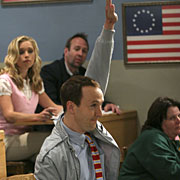History Friday: Getting Back To Basics
Maryland's Herald-Mail has a neat little 17-question quiz in basic American history. Think you could pass the test? After you've had a look, click here for the answers. Be sure to scroll-down. Would you get an "A" or an "F"? Or would it be something in between? Here we go:
1. French and English claims to land along this river led to the French and Indian War.
2. Representation in this political body was an important English right that was denied to the colonists.
3. People who wanted America to be free from English rule were called this.
4. What was the name of the act that required a stamp or seal to be affixed to every document in the colonies?
5. The British eventually dropped all taxes on the colonists except for a tax on this beverage.
6. Who was the Massachusetts patriot who rode from Boston to warn the colonists at Lexington that the British were coming?
7. Name the Virginia patriot who said, "Give me liberty or give me death!"
8. Which battle showed the British that untrained Americans could fight?
9. Name the patriot who said, "I only regret that I have but one life to lose for my country."
10. This agreement signed by England gave the colonies their freedom.
11. He wrote the Declaration of Independence.
12. This document is the plan for the government of the United States that is still used today.
13. What are the three branches of government?
14. Who is given credit for doing the most work at the Constitutional Convention?
15. Name the two houses of Congress.
16. Who is said to have stitched the first U.S. flag?
17. This is a form of government in which the people and their elected representatives are limited by a constitution.
I've always enjoyed history. I guess that's why I enjoy teaching it to the kids. Now as for the adults in our school.... well, that's another post!
















